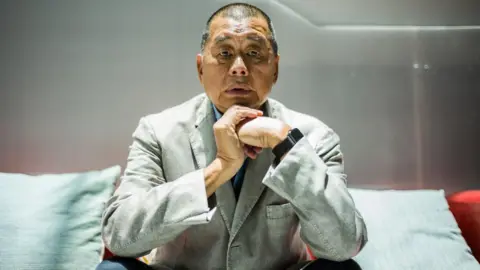The landmark trial of Hong Kong’s prominent pro-democracy figure, Jimmy Lai, has faced delays due to severe weather conditions. The trial centers around charges of colluding with foreign forces, under the stringent national security law imposed by Beijing. Although closing arguments were slated to commence, a “black” rainstorm warning, which represents the highest level of alert, caused the suspension of proceedings as a typhoon battered the region. Following local time guidelines, the hearings will remain halted until the weather threat is downgraded – a reminder of the precarious and often volatile climate in both a literal and political sense.
Jimmy Lai, aged 77, is not only a media tycoon but also a symbol of resistance against perceived encroachments on personal freedoms in Hong Kong. A significant aspect of the trial’s implications is highlighted by international reactions, including a statement by the UK’s Prime Minister, Sir Keir Starmer, calling for Lai’s immediate release. His dual nationality complicates matters further; while he holds British citizenship, China doesn’t accept dual nationalities, viewing Lai as exclusively Chinese, thus escalating tensions on a diplomatic scale. Notably, Lai has been held in detention since December 2020 and could face a life sentence if convicted, raising concerns about human rights practices under the current regime.
The case against Lai extends beyond mere legal charges; it reflects the broader narrative of political oppression and the judicial system’s weaponization in Hong Kong. Lai’s history as a fierce critic of the Chinese government sets him apart from other business moguls who might lean toward compliance. He established himself as a vocal advocate for democracy following the 1989 Tiananmen Square protests, expressing himself not just as an entrepreneur but as an activist. He once claimed, “I’m a born rebel,” underscoring a lifelong commitment to challenging injustice.
In recent years, Lai’s media outlets, including the influential Apple Daily, have been pivotal in chronicling and criticizing governance in Hong Kong. The coverage has resonated with both local and international audiences, earning him admiration as well as antagonism. While supporters see him as a courageous figure defending the freedoms of Hong Kong, adversaries label him a traitor, emphasizing the stark ideological divides present in the region.
The implications of Lai’s trial are profound, marking a critical juncture in Hong Kong’s relationship with China. Since the introduction of the national security law in 2020, dissent has been systematically silenced, with critics arguing that the law has made opposition movements virtually untenable. Lai, considered the most notable individual prosecuted under these regulations, exemplifies the ramifications of Beijing’s crackdown on political dissent. His case underscores the potential fate of future dissidents in a society where the legal framework is increasingly aligned with authoritarian objectives.
Lai’s son, Sebastien, has publicly sought to garner international attention for his father’s plight. He has echoed calls for global leaders to intervene, citing his father’s deteriorating health during imprisonment. This plea for support paints a somber picture of the personal toll of political oppression, as families often bear the brunt of these conflicts.
Biographically, Lai’s journey is a classic ‘rags to riches’ narrative. Originating from a wealthy family in Guangzhou, he witnessed their downfall after the rise of communism and fled to Hong Kong as a stowaway. Despite starting from nothing, he ascended to prominence, founding an empire that included the successful clothing brand Giordano. However, he quickly transitioned from a business tycoon to a devoted activist following the Tiananmen massacre, further solidifying his role in Hong Kong’s struggle for democracy. His tenacity and candor in the face of adversity have earned him a revered place in the hearts of many Hongkongers.
In summary, the machinations surrounding Jimmy Lai’s trial are emblematic of larger issues at play in Hong Kong, where personal freedoms are increasingly stifled under governmental scrutiny. As Lai’s courtroom saga unfolds, it carries significant weight not only for those directly involved but also for the global community observing the window into China’s burgeoning authoritarian approach to governance. The coming days will be crucial not just for Lai but also for the broader question of what lies in store for Hong Kong’s future.











